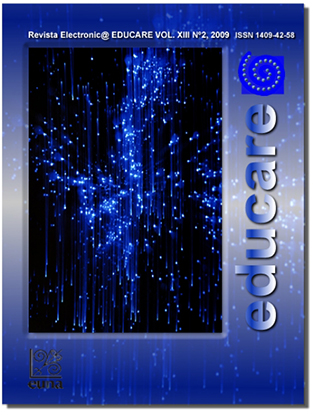Propuesta curricular de habilidades adaptativas para la estimulación temprana de niños y niñas de 0 a 3 años de edad, con discapacidad cognitiva
DOI:
https://doi.org/10.15359/ree.14-1.12Keywords:
curricullum, integral atention, adaptive skills, adaptive behaviors, special education, familyAbstract
Abstract. The study developed builds a curriculum proposal based on adaptive skills for early stimulation of children from 0 to 3 years with cognitive disabilities as a final requirement for graduation from the Masters in Education with Emphasis on Development The proposal intends to improve the coherence, relevance and effectiveness of special education offered to students with special educational needs, specifically with cognitive impairment conditions, from early stimulation with a population of 0 to 3 years. The main objective of the study rises from the working context of the study: the individual needs of special education teachers and their students.
References
Becco, G. (2000). Vigotsky y las teorías del aprendizaje. Recuperado el 25 de setiembre, 2008, de
http://perso.wanadoo.es/angel.saez/pagina_nueva_165.htm
Costa Rica. Ministerio de Educación Pública. Departamento de Educación Especial. (2005). Normas
y procedimientos para el manejo técnico-administrativo de los servicios educativos para
estudiantes con retardo mental. San José, Costa Rica: Litografía e Imprenta LIL.
Delgado, W. (2007). Propuesta curricular para la Maestría Profesional en ciencias de la educación
con énfasis en administración educativa basada en competencias Trabajo final de investigación
aplicada del programa de estudios de posgrado en educación. San José, Costa Rica: Sede
Rodrigo Facio de la Universidad de Costa Rica.
Esquivel, M. (2008, Setiembre). Currículum para la Educación Especial. Entrevista. Heredia, Costa
Rica: Universidad Nacional.
Papalia, D., Wendkos, S. & Duskin, R. (2005). Psicología del desarrollo. De la infancia a la adolescencia.
(9ª ed.). México, D. F.: McGraw Hill.
Peralta, M. (2002). Una pedagogía de las oportunidades. Nuevas ventanas para los párvulos latinoamericanos
del siglo XXI. Santiago, Chile: Editorial Andrés Bello.
Tryphon, A. & Vonèche, J. (2000). Piaget-Vigotsky: la génesis social del pensamiento. Buenos Aires,
Argentina: Paidós.
Verdugo, N. & Jenaro, C. (2004). Retraso Mental. Definición, clasificación y sistemas de apoyo. (10ª
ed.). Madrid, España: Alianza Editorial.
Zúñiga, E. (2008, Octubre). Currículum para la Educación Especial. Entrevista. Heredia, Costa
Rica: Universidad Nacional.
Downloads
Published
How to Cite
Issue
Section
License
1. In case the submitted paper is accepted for publication, the author(s) FREELY, COSTLESS, EXCLUSIVELY AND FOR AN INDEFINITE TERM transfer copyrights and patrimonial rights to Universidad Nacional (UNA, Costa Rica). For more details check the Originality Statement and Copyright Transfer Agreement
2. REUTILIZATION RIGHTS: UNA authorizes authors to use, for any purpose (among them selfarchiving or autoarchiving) and to publish in the Internet in any electronic site, the paper´'s final version, both approved and published (post print), as long as it is done with a non commercial purpose, does not generate derivates without previous consentment and recognizes both publisher's name and authorship.
3. The submission and possible publication of the paper in the Educare Electronic Journal is ruled by the Journal’s editorial policies, the institutional rules of Universidad Nacional and the laws of the Republic of Costa Rica. Additionally, any possible difference of opinion or future dispute shall be settled in accordance with the mechanisms of Alternative Dispute Resolution and the Costa Rican Jurisdiction.
4. In all cases, it is understood that the opinions issued are those of the authors and do not necessarily reflect the position and opinion of Educare, CIDE or Universidad Nacional, Costa Rica. It is also understood that, in the exercise of academic freedom, the authors have carried out a rogorous scientific-academic process of research, reflection and argumentation thar lays within the thematic scope of interest of the Journal.
5. The papers published by Educare Electronic Journal use a Creative Commons License:














 The articles published by Educare Electronic Journal can be shared with a Creative Commons License:
The articles published by Educare Electronic Journal can be shared with a Creative Commons License: 



